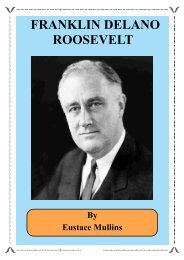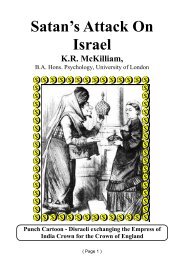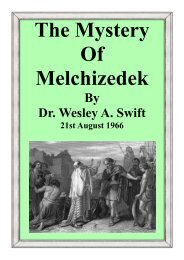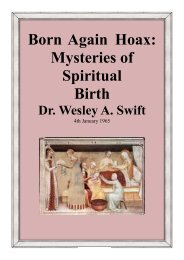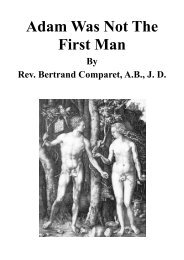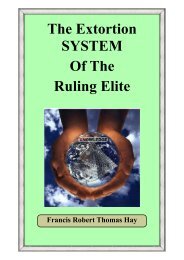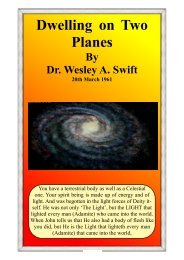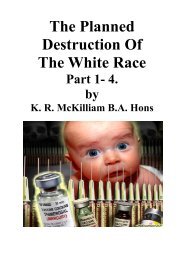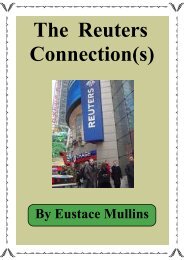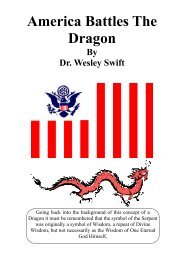Curse of Cannan - The New Ensign
Curse of Cannan - The New Ensign
Curse of Cannan - The New Ensign
Create successful ePaper yourself
Turn your PDF publications into a flip-book with our unique Google optimized e-Paper software.
political community formed and brought into existence by the Constitution <strong>of</strong> the United States,<br />
and as such become entitled to all the rights and privileges, and immunities, guaranteed by that<br />
instrument to the citizen? .. <strong>The</strong> words 'people <strong>of</strong> the United States' and 'citizens' are synonymous<br />
terms, and mean the same thing ... 'the sovereign people' .... <strong>The</strong> question before us is, whether<br />
the class <strong>of</strong> persons described in the plea in abatement comprise a portion <strong>of</strong> this people and are<br />
constituent members <strong>of</strong> this sovereignty? We think they are not, and that they are not included,<br />
and were not intended to be included, under the word 'citizens' in the Constitution, and can,<br />
therefore, claim none <strong>of</strong> the rights and privileges which that instrument provides for and secures<br />
to citizens <strong>of</strong> the United States. On the contrary, they were at that time considered as a subordinate<br />
and inferior class <strong>of</strong> beings, who had been subjugated by the dominant race, and, whether<br />
emancipated or not, yet remained subject to their authority, and had no rights or privileges but<br />
such as those who held the power and the government might choose to grant them .... In the<br />
opinion <strong>of</strong> the Court, the legislation and histories <strong>of</strong> the times, and the language used in the<br />
Declaration <strong>of</strong> Independence, show, that neither the class <strong>of</strong> persons who had been imported as<br />
slaves, nor their descendants, whether they had become free or not, were then acknowledged as<br />
a part <strong>of</strong> the people, nor intended to be included in the general words used in that memorable<br />
instrument .... <strong>The</strong>y had for more than a century before been regarded as beings <strong>of</strong> an inferior<br />
order; and altogether unfit to associate with the white race, either in social or political relations;<br />
and so far inferior that they had no rights which the white man was bound to respect; and that<br />
the negro might justly and lawfully be reduced to slavery for his benefit .... This opinion was at<br />
that time fixed and universal in the civilized portion <strong>of</strong> the white race. It was regarded as an<br />
axiom in morals as well as in politics, which no one thought <strong>of</strong> disputing, or supposed to be open<br />
to dispute; and men in every grade and position in society daily and habitually acted upon it in<br />
their private pursuits, as well as in matters <strong>of</strong> public concern, without doubting for a moment the<br />
correctness <strong>of</strong> this opinion .... <strong>The</strong>re are two clauses in the Constitution which point directly and<br />
specifically to the negro race as a separate class <strong>of</strong> persons, and show clearly that they were not<br />
regarded as a portion <strong>of</strong> the people or citizens <strong>of</strong> the Government then formed ... the right to<br />
import slaves until the year 1808 .... and the States pledge to each other to maintain the right <strong>of</strong><br />
property <strong>of</strong> the master, by delivering up to him any slave who may have escaped from his service<br />
.... the right <strong>of</strong> property in a slave is distinctly and expressly affirmed in the Constitution ... the<br />
Circuit Court <strong>of</strong> the United States had no jurisdiction in this case, and could give no judgment<br />
on it... Its judgment for the defendant must, consequently, be reversed, and a mandate issued<br />
directing the suit to be dismissed for want <strong>of</strong> jurisdiction."<br />
<strong>The</strong> Chief Justice <strong>of</strong> the Supreme Court paid dearly for this decision. His name has almost entirely<br />
been erased from the legal history <strong>of</strong> this nation; he was repeatedly threatened with house arrest<br />
during the Civil War by President Lincoln, and after the war, his two elderly daughters, shunned<br />
as prospective brides, eked out a precarious existence as government clerks at the very bottom<br />
<strong>of</strong> the pay scale, always on the verge <strong>of</strong> complete destitution.<br />
After the Dred Scott decision, events moved rapidly toward an actual military confrontation,<br />
with the Knights <strong>of</strong> the Golden Circle taking their places throughout the Southern states. John<br />
Brown then attacked Harper's Ferry, an incident which was intended to set <strong>of</strong>f a slave uprising<br />
throughout the South. <strong>The</strong> anticipated popular revolution failed to materialize, and Brown was<br />
captured and hanged. To this day, he remains a martyr in the cabbalistic circles <strong>of</strong> <strong>New</strong> England,<br />
the Fundamentalists. <strong>The</strong>ir ideological leader, Ralph Waldo Emerson, wrote, "He makes the<br />
gallows as Glorious as the Cross." Emerson later promoted John Brown as "a new Saint in the<br />
calendar."<br />
In order to arouse provocation for the Fort Sumter attack, Lincoln now dispatched heavy<br />
reinforcements to the fort. Even his Secretary <strong>of</strong> War, Seward, objected to his move, suggesting<br />
instead that Fort Sumter be yielded peacefully to the state <strong>of</strong> South Carolina. Lincoln himself<br />
was eagerly anticipating the approaching bloodbath and would hear <strong>of</strong> no compromise. He is<br />
known to have suffered from hereditary insanity, which did not come from the Lincoln family,<br />
for they were not his actual forebears. His mother, Nancy Hanks, being homeless, had been taken<br />
( Page 78)



